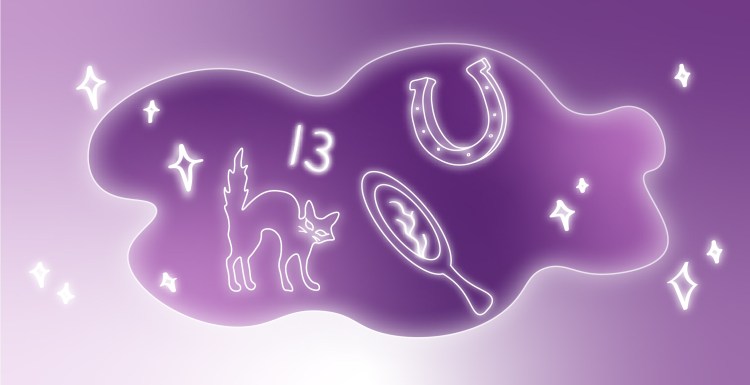
With Halloween season/spooky season coming up I thought it would be appropriate to talk about something that has always fascinated me: superstitions.
Not too long ago, I was zoning out and the thought popped up “Where do superstitions come from and why do we believe in them?” I have always believed in the basics: knocking on wood, lucky pennies, breaking mirrors and lucky items like clothing, but what made me believe in those things that led to me still believing in them?
First, we must ask the question: What is a superstition?
According to the Oxford Dictionary superstitions are “excessively credulous beliefs in and reverence for supernatural beings.” They are both cultural or personal beliefs that make connections between unrelated items or events that people believe to affect real life events. Some superstitions come from religious beliefs such as the number thirteen.
According to some beliefs, the number thirteen is associated with when Jesus dined with his twelve disciples before being arrested and crucified. The result of that event created the idea that having thirteen people at a table was deemed unlucky, which then lead to the number thirteen being unlucky in general.
In Egyptian mythology, umbrellas were used to protect themselves from Ra, the sun god, while outside. However, if an umbrella is opened inside that is considered an insult to Ra and that’s where opening umbrellas inside comes from.
Most superstitions have a connection to the belief of the supernatural or a fear of the supernatural. A superstition that I use just about every day knocking on wood comes from the Indo-European belief that spirits reside in trees. According to Stuart Vyse on a TED-Ed lesson, when you knock on the wood, it invokes a blessing from the spirit.
Mirrors are objects that are believed to trap spirits within them. Not only is it bad luck to break a mirror but it can also be considered a bad omen in South America if you don’t cover the mirrors within a household when a loved one dies because it is believed that spirits can be trapped in the mirrors.
In Japan “tucking in your thumbs” when walking through a graveyard is considered a superstition because thumb translated in Japanese means “parent finger.” When you tuck your thumbs through a graveyard, you are protecting your parents from death. I find this superstition similar to holding your breath when driving by a graveyard because you will get possessed that way.
A lot of superstitions are based off unfortunate coincidences and associations. One that I believe in is saying “Macbeth” in a theatre. This superstition comes from the fact that the Scottish play was cursed by witches who were offended by Shakespeare’s take on spells, and from that moment the show was cursed.
Another one like that is whistling during a show within a theatre because during the 17 and 18 centuries stagehands would lower and raise the backdrops for shows. The stagehands would whistle back and forth to each other to communicate so if someone in the audience were to whistle it could cause a miscommunication which could led to accidents on stage or death. Even today no one is supposed to whistle in a theatre because of the misfortunes that would happen from it.
Most superstitions are developed from experience, witness or from culture/media. Most superstitions I believe in I have learned from my family or from watching TV.
What I found interesting is that when I’ve asked others about superstitions, most first heard that superstition from was from family and friends. They did not question it, they just believed it from that one source, and it stuck with them.
So why is it that they still hold on to those superstitions?
Well, superstitions are cultural habits that conscious belief. Which means that we make a judgement on what we perceive to believe based on what we hear from those close to us. They are learned beliefs like religion, routines or practices.
From a psychological standpoint superstition are an illusion for us to have greater control over events and ourselves. Why else would you have a lucky pair of socks? You believe that those socks hold some sort of value to you that have helped you get through games, test or any other obstacle you had to face.
There is nothing wrong with having some sort of control over our lives even if we believe in silly things like lucky charms or knocking on our wooden desk.
Sarah Clayton is a writer for The Alabamian. She is a third-year senior theatre major who enjoys all things theatre related. When she is not writing for The Alabamian or busy with classes she enjoys listening to music, reading, making TikToks, watching movies or TV shows she has already seen and hanging out with friends.

 Graphic by Bell Jackson.
Graphic by Bell Jackson. 






